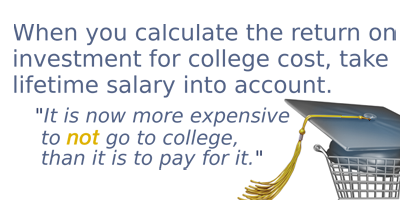 As college tuition continues outpacing inflation across the U.S., the “traditional student” model is changing. More and more Americans are looking for affordable online colleges that let them earn a degree credential without breaking the bank or needing to quit a current job.
As college tuition continues outpacing inflation across the U.S., the “traditional student” model is changing. More and more Americans are looking for affordable online colleges that let them earn a degree credential without breaking the bank or needing to quit a current job.
Indeed, tuition is rising. But the upside is that just as costs vary widely among campuses, so do costs for affordable online degrees.
How Much Does Online College Cost?
As we mentioned in our 2014 Best Buy online college rankings, “An online degree can cost as little as $5,000 or more than $145,000.”
We surveyed 3,000 accredited online degrees, and our list features the most affordable online colleges in each category. Depending on your subject of study, the most affordable online degree for you is not necessarily the one with the smallest tuition and fees listed. Online college cost should be considered alongside other metrics like quality, student support systems, and relevance to your career goals.
As of Spring 2013, these are examples of average costs of online degrees compared to the most inexpensive online colleges for that degree category.
Examples of the Most Affordable Online Colleges
Graduate
Regionally Accredited Online MBA
- Average cost: $24,663
- Least expensive: $6,389 – Eastern New Mexico University
Online Master’s in Computer Science
- Average cost: $25,670
- Least expensive: $6,360 – East Carolina University
Online Master’s in Health Science
- Average cost: $24,064
- Least expensive: $7,482 – Fort Hays University Online
Undergraduate
Online Bachelor’s in Business Administration (BSBA)
- Average cost: $47,472
- Least expensive: $15,481 – University of Florida
Online Bachelor’s in Computer Science
- Average cost: $49,546
- Lease expensive: $18,479 – Middle Georgia State College
Online Bachelor’s in Nursing (BSN)
- Average cost: $44,211
- Least expensive: $19,715 – Western Carolina University
View More Affordability Rankings
Online College Cost Versus Future Salary Potential
If you already have a high school diploma, studies, such as the Survey of Income and Program Participation (SIPP) survey tabulated by the Pew Research Center, show that you’re likely to experience lateral increases in salary if you go on to earn other credentials. That includes associate’s, bachelor’s, master’s, Ph.D., and so on.
For example, the report examined median adjusted monthly household incomes of 25- to 34- year-olds, and found that incomes for those earning bachelor’s degrees rose from about $5,960 to more than $7,200 per month.
If you or your spouse attained a master’s degree level of education, salaries rose an average of about $1,670 per month.
How Much is Online College Worth for Each Credential Level?
When you calculate the return on investment for college cost, take lifetime salary into account. It is now more expensive to not go to college, than it is to pay for it. Gone are the days when construction supervisors, loans officers, insurance clerks and executive assistants, could usually qualify for positions with a high school diploma.
Sometimes an associate’s degree may fulfill your career goals at a fraction of the cost of a bachelor’s or master’s degree. Other times, you may need to step up from a master’s to a Ph.D. to make the leap into your desired career role.
 Start Small for the Lowest Online College Tuition & Expenses
Start Small for the Lowest Online College Tuition & Expenses
An affordable online college, whether it’s for a 2-year degree associate or 4 years for a bachelor’s degree, can be even more affordable depending on your time to graduation.
The pay-as-you go method is not just for cable or phone bills. Taking on only as many online college credits as you can afford at a time is one way to minimize student debt.
According to the Department of Education, almost 60 percent of students graduate in six years (compared to 40% of students graduating within four years). Pay-as-you-go payment plans are increasingly an affordable alternative to the traditional 4-year-college model.
While not always ideal for graduation outcomes, it can be a better option for you if you are juggling responsibilities such as family and a full-time job. For example, a tax professional can opt for taking one class per quarter during the busy tax season, then ramp up to more classes during the off-season.
If you opt to be a part-time student to cut down on your overall online college cost, avoid paying fees reflective of full-time enrollments by checking for flat tuition rates at the affordable online schools you’re considering. For example, Western Governors University treats all students as full-time by charging tuition at a flat rate regardless of the number of credits taken (or attempted) within a half-year term.
View Online Degrees from Western Governors University
But Doesn’t Enrolling Full-Time Mean Getting The Most Affordable Online Degree?
When you’re researching affordable online colleges, some variables to a school’s quality include its graduation rate, retention rate, job placement rate, and loan default rate.
Combined, all four of these factors make a strong case for full-time enrollment (if it can be done). For bachelor’s degree programs, the four-year graduation model is still the standard of successful outcomes.
Strong student retention = strong graduation rate. A study from the National Student Clearinghouse found that students enrolled part-time are less likely to graduate within six years.
Opportunity cost of being in school for an extra year (or two). If you miss out on a year or two of income in the workforce, can you recoup it later?
Repay student loans (if any) faster. Getting a job offer in your preferred career as soon as possible, means paying the bills faster; ergo, chances of loan default drop.
Today, many affordable online degrees are structured flexibly so that you can design a full-time curriculum around your lifestyle, and not vice versa.
Buyer Beware: Unaccredited Cheap Online Colleges
Accredited online colleges with low tuition are the best kind of online college investment. Not only can you get more bang for your buck (or credit-hour), the accreditation can also make it easier to transfer to another school.
If unaccredited, the cheapest online degree you find may end up costing you more. Consider the academic rigor and reputation your degree holds in future employers’ eyes.
Also, there’s the other financial risk of enrolling in inexpensive online degrees offered by unaccredited colleges. In order for schools to join federal student aid programs, the U.S. Department of Education requires accreditation. The same may be true at the state level, should you look for state-based financial aid.
Your goal should be to find affordable online degrees accredited by a nationally or regional authority, to ensure that the school’s curriculum meets certain standards of quality. To check if the affordable online colleges you’re thinking of attending have the appropriate accreditation, check with the accreditation database provided by the U.S. Department of Education’s Office of Post-Secondary Education (OPE).
How Can I Affordably Attend An Out-of-State Online School?
Yearning to expand your horizons by studying in a new state, but worried about paying the out-of-state tuition penalty? You’re in luck—online colleges often do not need to abide by out-of-state tuition price structures.
There are exceptions, however. Another option is state and regional college discount programs geared towards residents who wish to affordably attend a university in another state. Known as tuition exchange or reciprocity programs, these programs are available in major U.S. Regions. Bonus: You may not need to fill out a FAFSA to qualify.
School-based Financial Aid Versus State Grants
Financial aid can make an expensive college much more affordable. Be sure to check out aid offered both by schools and states:
School-based financial aid. Many online colleges with financial aid have applications available for scholarships, loans, grants, and work-study programs.
State grants. The federal government is a widely known provider of financial aid (such as Pell and Stafford grants). But did you know that your state may also have grants available to make that online college more affordable? Funded in part by property taxes and lottery funds, these state grants can help boost your financial aid plan in the form of grants, scholarships and loans, and work-study opportunities.
How Can I Get Someone Else to Pay My Online College Tuition?
Aside from financial aid, there are a number of ways to find funding for an online degree.
Employer-Sponsored Tuition Reimbursement: If you are currently working, you may be able to qualify for an employer tuition assistance program. Sponsorships vary, but you may be able to get up to $5,250 in tuition reimbursement, per section 127 of the Internal Revenue Code.
You often will need to meet a specific GPA, and take courses that are relevant to your employer’s mission.
U.S. Military. Both civilians and veterans often take advantage of online education. One benefit to serving your country, is the opportunity to advance your skill-set with an online degree for little to no cost. While most private sector employers cap their sponsorships (see above), Congress allows each U.S. military branch to subsidize up to 100% for its members’ tuition expenses essentially making many online colleges tuition free.
The U.S. Department of Veterans Affairs manages VA education benefit programs, of which provide a number of various options, depending on your eligibility. For most, the Post-9/11 GI Bill provides the best option and includes two added programs not found in other VA education programs:
Instead of searching for the cheapest online colleges per credit hour, the Yellow Ribbon can help eligible veterans attend otherwise pricey private schools at much-reduced (if any) cost.
The Transfer of Entitlement option allows eligible servicemembers to transfer all or portions of unused education benefits to their spouse or dependent children.
Tuition and Fees: Hidden Costs Can Hinder Affordability
To realistically pare down online college cost (and sticker shock), note that not all colleges publicize a total tuition and fees schedule. For example, while the Yellow Ribbon program covers tuition in its entirety, it seldom covers private schools’ full tuition and fees.
When calculating total online college cost, compare your technological costs with on-campus expenses that you would have to pay if attending class in person. Most online schools only require, on top of other administrative fees, a technology fee that helps provide access to wireless and wired networking, curricular software in computer labs, and technical support.
Take a close look at the tuition package details, and note the differences between fees that online students pay versus the fees that on-campus students pay.
For example, Grand Canyon University’s fees are different for traditional students and online students.
| Fees for Non-Traditional Students: | Fees for Traditional Students: |
|
|
Online College Tuition Breakdown
You will encounter different types of fees at different online colleges, such as a Document fee, or a Student Service Facility Fee.
Traditional colleges, even those with credit-hour tuition comparable to an affordable online college, come with add-on expenses.
The cost savings from taking courses at affordable online colleges can be substantial. At an Arizona state school, for example, the total undergraduate resident tuition and fees is $891, compared to $563 for a student enrolled as an online student.
But the cost difference between a traditional degree program and online program at the same school, is oftentimes smaller than the cost difference between schools. For example, our ranking list for online master’s in nursing revealed that there is over nine times the difference in tuition between these two schools’ nursing programs:
- Cheapest: $8,206 – Fort Hays State University
- Most Expensive: $75,600 – Georgetown University
Finding Affordable Online Colleges is Easy
We update our affordability rankings of the best online colleges every two years.
Keep an eye out for our Spring 2016 update! If you have your eyes on a regionally accredited college or degree that isn’t available on our ranking list, please contact us at [email protected].
Related Resources
Cheapest Online Colleges for a Bachelor’s Degree
Are Expensive Online Colleges Better Than Cheap Ones?
6 Tricks Colleges Use to Appear More Affordable
Video Guide: How to Find Affordable Online Bachelor’s Degrees
Video Guide: How to Find Affordable Online Master’s Degrees
 ABOUT THE AUTHOR: Aimee Chou has written education-oriented articles featured in MSN, GradSchools.com, CareerBuilder, eLearners, and EarnMyDegree.com. She recently earned a certificate in programming for mobile web development. As an accessibility advocate, she writes about Deaf Community topics for consumer review platform DeafFriendly.com.
ABOUT THE AUTHOR: Aimee Chou has written education-oriented articles featured in MSN, GradSchools.com, CareerBuilder, eLearners, and EarnMyDegree.com. She recently earned a certificate in programming for mobile web development. As an accessibility advocate, she writes about Deaf Community topics for consumer review platform DeafFriendly.com.
